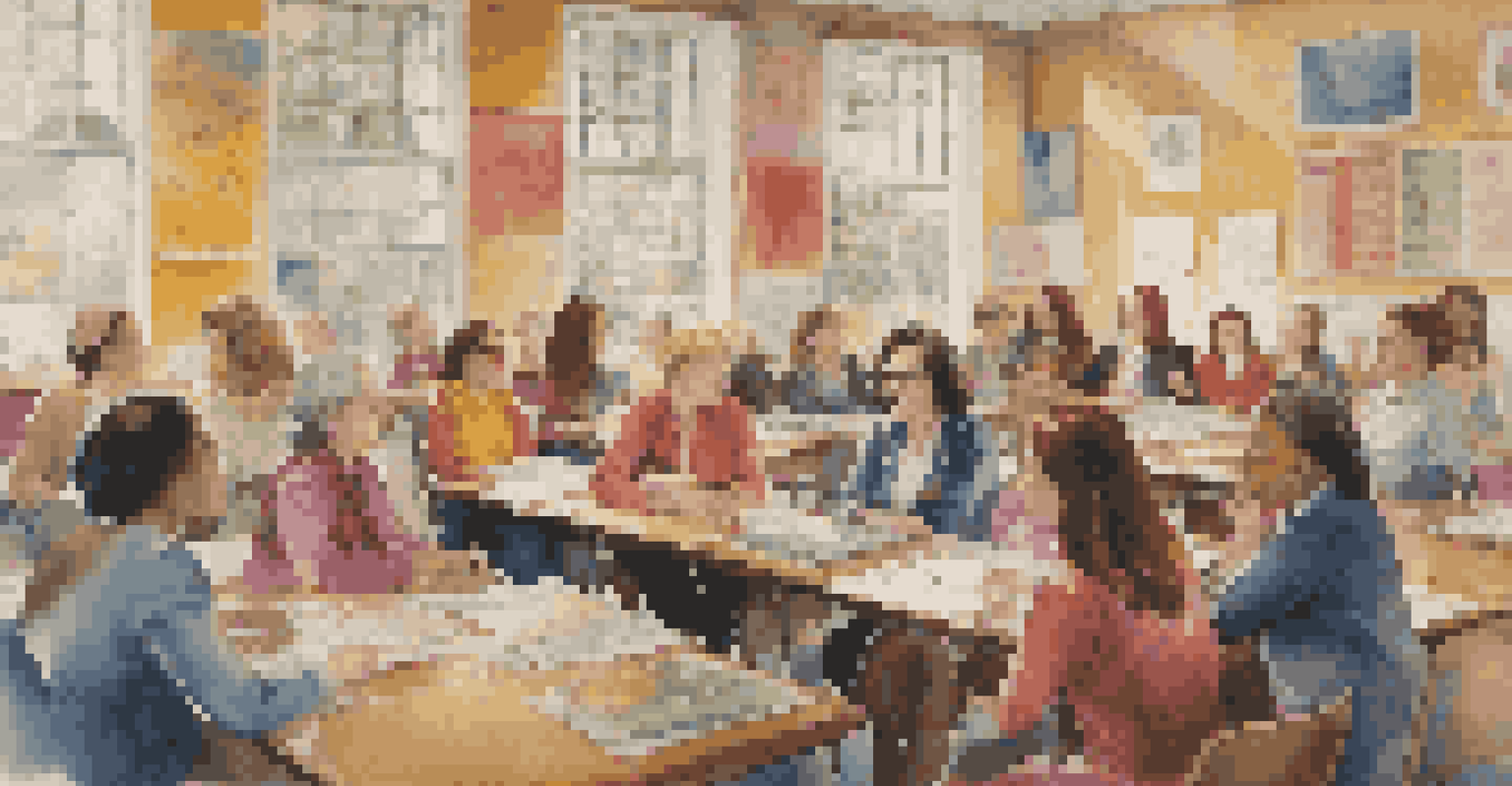The Contribution of Women in History: Researching Their Impact

Women in Ancient Civilizations: Unsung Heroes
Throughout ancient civilizations, women played crucial roles, often overlooked by history. From Egyptian queens like Cleopatra to influential figures in Mesopotamian societies, women's contributions shaped politics, culture, and society. Their involvement in governance and trade showcases a complexity that challenges the traditional male-centric narratives of history.
The history of women is the history of the world. It is a story of resilience, of strength, and of the relentless pursuit of equality.
For instance, Hatshepsut, one of the few female pharaohs of Egypt, ruled with remarkable authority and initiated prosperous trade expeditions. Her reign changed perceptions of women's capabilities in leadership, proving that they could govern effectively. Such examples remind us that women's influence has been significant since ancient times, despite the lack of recognition.
Moreover, women in these societies were not only leaders but also innovators. They contributed to advancements in agriculture, medicine, and the arts, laying foundational knowledge that would benefit future generations. As we delve into history, it becomes clear that understanding women's roles enriches our perspective of past societies.
The Middle Ages: Women as Influencers and Leaders
During the Middle Ages, women often wielded influence behind the scenes. Figures like Eleanor of Aquitaine exemplified how women could shape political landscapes through marriage alliances and patronage. Her life highlights how women were vital in maintaining power, even if they rarely held formal titles.

Additionally, women contributed significantly to the economic fabric of medieval society. Many managed estates and engaged in trade, showcasing their skills in business and governance. This practical involvement in economic matters illustrates their essential role in sustaining communities, often while juggling domestic responsibilities.
Women's Historical Contributions
Women throughout history have played crucial roles in governance, culture, and social reform, often overlooked by traditional narratives.
The actions of women during this time also laid groundwork for future movements advocating for women's rights. Their resilience and resourcefulness in navigating a male-dominated world inspired later generations to challenge societal norms. By studying this era, we can see the enduring impact of women's contributions throughout history.
Renaissance Women: Patrons of Art and Knowledge
The Renaissance sparked a cultural rebirth that saw women emerge as patrons of the arts and sciences. Figures like Isabella d'Este and Christine de Pizan actively supported artists and scholars, helping to cultivate a vibrant intellectual environment. Their patronage played a crucial role in the flourishing of literature and art during this transformative period.
Women are the largest untapped reservoir of talent in the world.
Moreover, women like Artemisia Gentileschi broke barriers as artists in their own right, challenging gender norms in a male-dominated field. Gentileschi's powerful paintings not only showcased her talent but also conveyed strong narratives about women's experiences. Her work reflects the potential of women to shape cultural dialogues through their artistic expressions.
The Renaissance marked a pivotal point where women's voices began to resonate louder in the cultural sphere. Their contributions remind us that creativity and intellect know no gender, and by recognizing these women, we honor their legacy in shaping our cultural heritage.
Women in the Enlightenment: Advocates for Change
The Enlightenment era was characterized by a surge in intellectual thought, and women played an integral role in advocating for social reforms. Thinkers like Mary Wollstonecraft argued for women's rights and education, challenging the status quo of their time. Her seminal work, 'A Vindication of the Rights of Woman,' laid the groundwork for future feminist movements.
In salons across Europe, women gathered to discuss philosophy, politics, and science, influencing the course of Enlightenment thought. These gatherings were crucial for the exchange of ideas, allowing women to contribute to discussions that shaped modern democracy and human rights. Their involvement helped to democratize knowledge and promote critical thinking.
Advocates for Social Change
From the Enlightenment to the 19th century, women have been at the forefront of advocating for rights and equality, influencing social movements.
By examining the contributions of women during the Enlightenment, we gain insight into the early foundations of gender equality. Their advocacy for education and rights paved the way for future generations to continue fighting for social justice and equality, showing that women's voices were essential to progress.
Women in the 19th Century: Pioneers of Reform
The 19th century was a transformative period for women, marked by their active participation in social reform movements. Women like Susan B. Anthony and Elizabeth Cady Stanton were pivotal in the fight for women's suffrage, organizing rallies and advocating for voting rights. Their relentless efforts laid the foundation for future generations to pursue equality in various spheres.
Additionally, women were at the forefront of the abolitionist movement, fighting against slavery and advocating for human rights. Figures like Harriet Tubman and Sojourner Truth used their voices and experiences to inspire change, demonstrating that women could be powerful agents of social justice. Their courage and determination left an indelible mark on history.
The contributions of women in the 19th century illustrate the interconnectedness of various social movements. By championing causes for equality, these women not only fought for their rights but also advanced the rights of others, emphasizing the importance of solidarity in social change.
Women in the 20th Century: Champions of Progress
The 20th century saw women take on pivotal roles in various fields, from politics to science. Leaders like Eleanor Roosevelt and Margaret Thatcher broke barriers in governance, showcasing women's capabilities in leadership positions. Their journeys inspire countless others to pursue careers in politics and public service, proving that women can lead effectively.
In the realm of science, women like Marie Curie and Rosalind Franklin made groundbreaking discoveries that changed our understanding of the world. Their contributions to physics and genetics not only advanced scientific knowledge but also challenged gender stereotypes in male-dominated fields. Their legacies continue to inspire women in STEM today.
Modern Leaders and Innovators
Today, women continue to break barriers in politics and business, shaping policies and promoting gender equality in various fields.
The fight for gender equality gained momentum throughout the century, with women advocating for workplace rights, reproductive rights, and equal pay. This era highlights how women's struggles and achievements are intertwined with broader social movements, reminding us that progress requires collective effort and perseverance.
Modern Women: Continuing the Legacy of Change
Today, women continue to shape history in various fields, from politics to technology. Figures like Kamala Harris and Jacinda Ardern exemplify women's leadership at the highest levels of government, inspiring future generations to engage in politics. Their visibility demonstrates that women's voices are crucial in shaping policies that affect everyone.
In business and technology, women like Sheryl Sandberg and Ginni Rometty have made significant strides, pushing for gender equality in corporate environments. Their advocacy for women's representation in leadership roles reflects the ongoing battle for equal opportunities in the workplace. This modern movement illustrates the importance of mentorship and support for women in all industries.

As we navigate contemporary challenges, the contributions of women remind us of the importance of diversity and inclusion. By celebrating women's achievements and amplifying their voices, we continue the legacy of change initiated by those who came before us, ensuring a more equitable future for all.